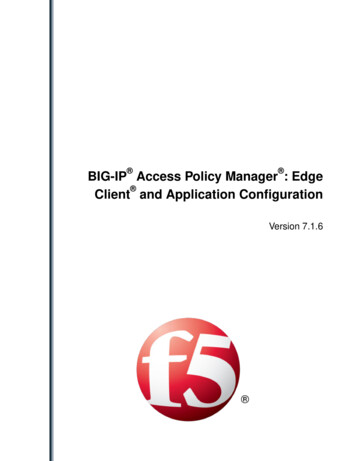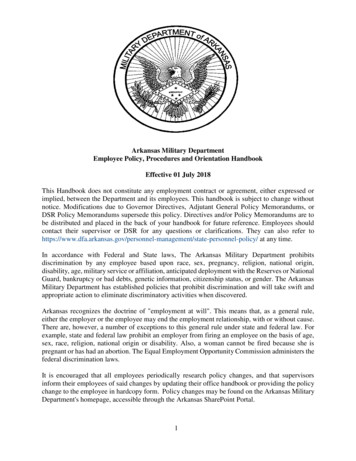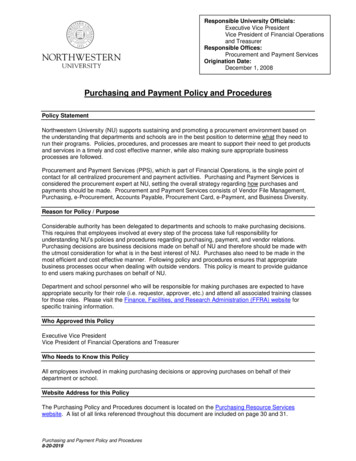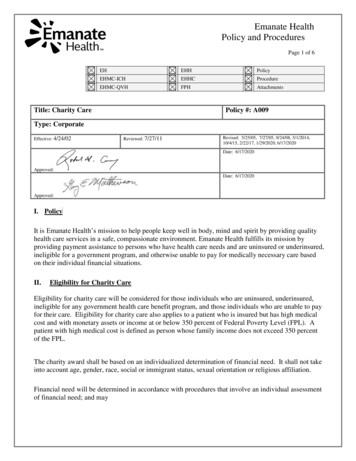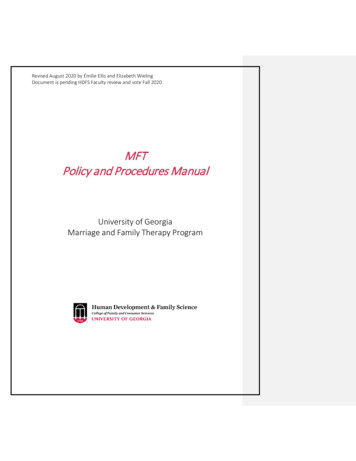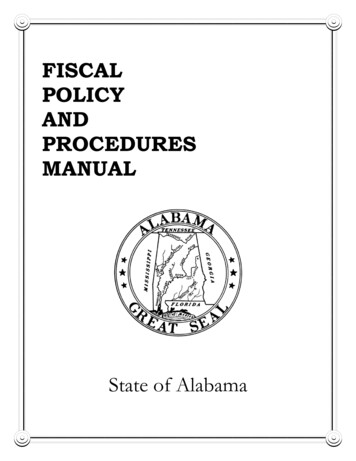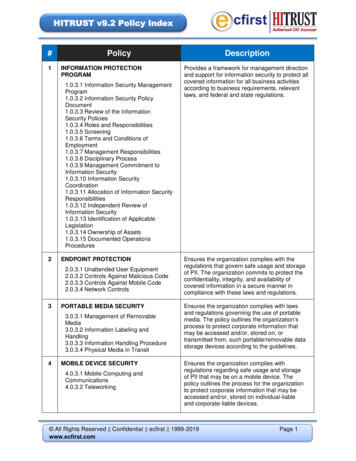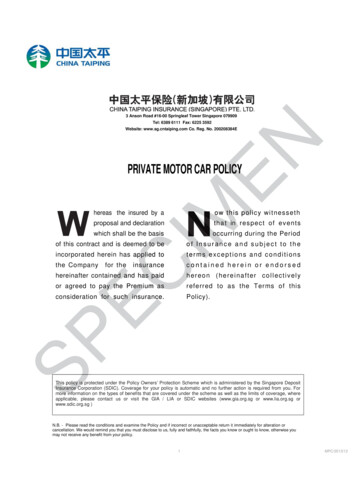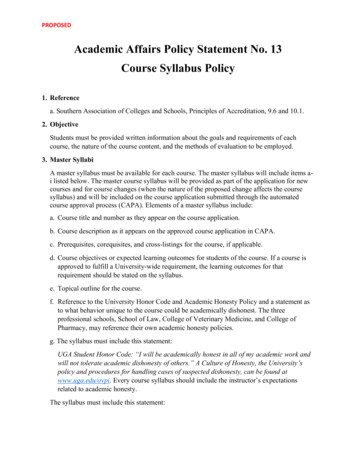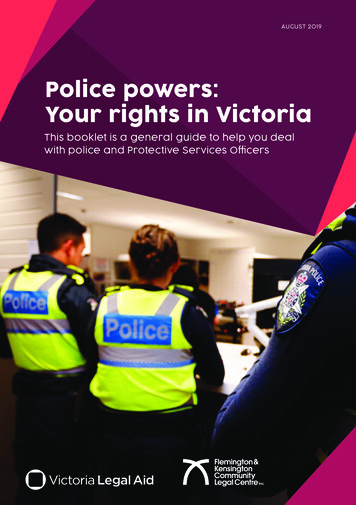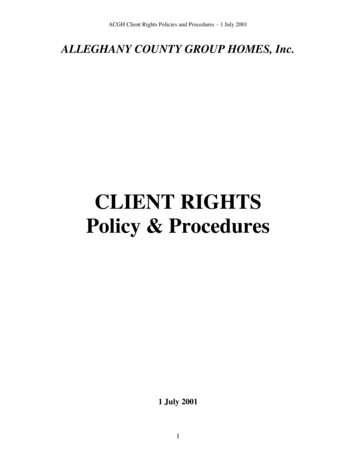
Transcription
ACGH Client Rights Policies and Procedures – 1 July 2001ALLEGHANY COUNTY GROUP HOMES, Inc.CLIENT RIGHTSPolicy & Procedures1 July 20011
ACGH Client Rights Policies and Procedures – 1 July 2001ALLEGHANY COUNTY GROUP HOMES, INC.SIGNATURE PAGEI, the undersigned officers of the Board of Directors, have read and approve these“Alleghany County Group Home, Inc. “Client Rights Policy and Procedures” dated 1July 2001 as written. I understand that it is the right of the Board of Directors to amendthese policies as required.Alleghany County Group Homes, rDateDate.2
ACGH Client Rights Policies and Procedures – 1 July 2001TABLE OF CONTENTSSignature Page . . . 2Table of contents . . . 314P PROCEDURES AND GENERAL INFORMATION.0100 SCOPE AND DEFINITIONS . 4.0101 SCOPE . 414Q.0100 GENERAL POLICIES AND PROCEDURES 4.0101 POLICY ON RIGHTS RESTRICTIONS AND INTERVENTIONS . 4.0102 SUSPENSION AND EXPULSION POLICY . 10.0103 SEARCH AND SEIZURE POLICY . . 12.0104 PERIODIC INTERNAL REVIEW . . 13.0200 INFORMING CLIENTS AND STAFF OF RIGHTS . 14.0204 INFORMING STAFF . 16.0300 GENERAL CIVIL, LEGAL AND HUMAN RIGHTS.0301 SOCIAL INTEGRATION . 17.0302 CLIENT SELF-GOVERNANCE 17.0303 INFORMED CONSENT . 18.305 PROTECTION FROM HARM ABUSE, NEGLECT OR EXPLOITATION. 2014R TREATMENT OR HABILITATION RIGHTS.0100 PROTECTION REGARDING INTERVENTION PROCEDURES . 21.0101 LEAST RESTRICTIVE ALTERNATIVE . 21.0102 PROHIBITED PROCEDURES . 22.0103 GENERAL POLICIES REGARDING INTERVENTION PROCEDURES. 23.0104 SECLUSION, RESTRAINT AND ISOLATION TIME-OUT . 24.0105 PROTECTIVE DEVICES . . . 31.0107 INTERVENTION ADVISORY COMMITTEES . . 33.0200 PROTECTION REGARDING MEDICATIONS 35.0201 SAFEGUARDS REGARDING MEDICATIONS . 35SUBCHAPTER 14S – 24 HOUR FACILITIES.0100 SPECIFIC RULES FOR 24-HOUR FACILITIES . . 35.0102 COMMUNICATON RIGHTS 35.0103 LIVING ENVIRONMENT . 35.0104 HEALTH, HYGIENE AND GROOMING . 36.0105 STORAGE AND PROTECTION OF CLOTHING AND POSSESSIONS. 36.0106 CLIENT’S PERSONAL FUNDS 37ATTACHMENTS . 393
ACGH Client Rights Policies and Procedures – 1 July 2001CLIENT RIGHTS14P PROCEDURES AND GENERAL INFORMATION.0100 SCOPE AND DEFINITIONS.0101 SCOPE(b) A facility is deemed to be in compliance with these rules if the facility is accredited bythe Joint Commission on Accreditation of Healthcare Organizations (JCAHO) or theCouncil on Accreditation of Rehabilitation Facilities (CARF), or is certified by theHealth Care Financing Administration (HCFA) as an Intermediate Care Facility for theMentally Retarded (ICF/MR)(C) When any of the accrediting bodies as specified in (b) of this rule set client rightsstandards which become effective after January 1, 1992, the Division shall present to theCommission an analysis of the comparability of those standards with 10 NCAC 14Pthrough 14S.14Q.0100 GENERAL POLICIES AND PROCEDURES.0101 POLICY ON RIGHTS RESTRICTIONS AND INTERVENTIONS.0101A The governing body shall develop policy that assures the implementation of G.S.122C-59, 122C-65, and G.S. 122C-66.0101B The governing body shall develop and implement policy to assure that:.0101B-1 all instances at alleged or suspected abuse, neglect or exploitation of client arereported to the County Department of Social Services as specified in G.S. 108A, Article44; andAll employees of Alleghany County Group Homes, Inc. (ACGH) have a moral,legal and ethical obligation to make a report to the Department of Social Services (DSS)if they have any reason to believe that a disabled adult needs protective services. Anyemployee who suspects an instance of alleged or suspected abuse, neglect or exploitationof a client, by any party, inside our outside this company, will immediately report thecircumstances to DSS, and to their supervisor. The Executive Director and/or supervisorwill insure that the report is filed as specified in G.S. 108A, Article 44. All staff willcooperate fully with DSS if an investigation is warranted. Any employee who reportssuspected abuse, neglect or exploitation of a client to DSS may do so without fear ofreprisal from the company.Steps for reporting abuse, neglect or exploitation:1. All reports must be made to the DSS within 24 hours of the time one becomesaware of the alleged incident.2. Contact DSS Protective Services by phone, in person or in writing.3. Be prepared to report the following information:A. Identify yourself, where you work and a telephone number where youcan be reached.4
ACGH Client Rights Policies and Procedures – 1 July 2001B. Identify the alleged person’s name and address, age, residence, natureand extent of injury or condition of abuse, neglect or exploitation.4. Make a notation in the client’s record that a report has been filed with DSS.5. Complete and submit a clinical incident report to the Risk Management Nurse.6. Notify supervisor and/or Executive Director prior to making the report but donot delay the report if they are not available.7. If the employee is dissatisfied with the outcome of the investigation he/shemay discuss the case with the Executive Director.8. The employee may further appeal to the Board of Directors if still not satisfiedwith the outcome.If in doubt, make a report. If the report is made in good faith, there is immunity fromcivil liability for reports to DSS. The identity of any employee making a report whocooperates in an ensuing investigation may generally not be disclosed without his/herconsent.This is a mandatory reporting law. Failure to report suspected abuse, neglect orexploitation may result in civil action. Failure to report may also result in disciplinaryaction and/or dismissal.0101B-2 procedures and safeguards are instituted in accordance with sound medicalpractice when a medication that is known to present serious risk to the client isprescribed. Particular attention shall be given to the use of neuroleptic medications.NA.0101C In addition to those procedures prohibited in Subchapter 14R .0102(1), thegoverning body of each facility shall develop and implement policy that identifies;1. any restrictive intervention that is prohibited from use within the facility; andThe following rights may not be restricted by company employees and each client mayexercise these rights at all reasonable time. The company will assist clients without themeans to exercise these rights if at all possible.1. Send and receive sealed mail and have access to writing material, postage, andstaff assistance when necessary.2. Contact and consult with, at his/her own expense and at no cost to the facility,legal counsel, private physicians, and private mental health, mental retardation, orsubstance abuse professional of his/her choice.3. Contact and consult with a client advocate if there is a client advocate.The following interventions are prohibited and are not to be used under anycircumstances:1. Any disrespectful, intolerant, or pernicious interaction that would beconsidered by most reasonable people to constitute verbal, emotional orpsychological abuse.5
ACGH Client Rights Policies and Procedures – 1 July 20012. Degrading punishment.3. Forced physical exercise solely for the purpose of eliminating behavior ratherthan for instructive or athletic value.4. Punitive work assignments.5. Group punishment for one person’s behavior.6. Contingent use of painful body contact.7. Substances administered to induce painful bodily reactions.8. Electric shock.9. Insulin shock.10. Mechanical restraints.11. Unpleasant tasting foodstuffs.12. Contingent application of any noxious substances which includes, but is notlimited to, noise, bad smells or splashing with water.13. Any potentially physically painful procedure or stimulus which isadministered to the client for the purpose of reducing the frequency or intensity ofa behavior, excluding prescribed infections.14. Unnecessary or excessive medication used for punishment, discipline or staffconvenience.15. Abuse, neglect or exploitation of a client.16. Any withholding of nutrition, hydration or other basic necessity.2. in a 24-hour facility, the circumstances under which staff are prohibited fromrestricting the rights of a client.0101D If the governing body allows the use of restrictive interventions or if, in a 24-hourfacility, the restrictions of client rights specified in G.S. 122C-62 (b) and (d) are allowed,the policy shall identify:1. the permitted restrictive interventions or allowed restriction;2. individual responsible for informing the client3. the due process procedures for an involuntary client who refuses the use ofrestrictive interventionsThe following rights cannot be restricted without thorough documentation and attentionto all governing regulations and rules:1. Make and receive confidential telephone calls. All long distance calls shall bepaid for by the client within 10 days of receiving the monthly phone bill,otherwise long distance service may be discontinued.2. Receive visitors between the hours of 8:00 a.m. and 9:00 p.m. for a period of atleast six hours daily, two hours of which shall be after 6:00 p.m.; however,visiting shall not take precedence over therapies. In addition visits are notallowed during ADVP work hours, 8:00 a.m. to 3:30 p.m. Monday through Fridayexcept during scheduled lunch or break times. All visitors must report toadministration and are not allowed in the work area without the Director’sapproval.6
ACGH Client Rights Policies and Procedures – 1 July 20013. Communicate and meet under appropriate supervision with individuals of hison choice upon the consent of the individuals.4. Make visits outside the custody of the Group Home after they have completedthe necessary training and documentation to ensure their safety.See Independence Certification at Attachment –1.5. Be out of doors daily and have access to facilities and equipment for physicalexercise several times per week.6. Except as prohibited by law, keep and use personal clothing and possessions.7. Participate in religious worship.8. Keep and spend a reasonable sum of his/her own money.9. Retain a driver’s license, unless otherwise prohibited by Chapter 20 of theGeneral Statutes.10. Have access to individual storage space for his/her private use.0101E If restrictive interventions are allowed for use within the facility, the governingbody shall develop and implement policy that assures compliance with section 14R .0100of these Rules, which includes:ACGH provides services in the least restrictive environments possible but recognizes thatthere are times when the restriction of a client’s right may be necessary. ACGH prohibitsthe restriction or abridgement of any person’s rights for the sake of programmatic ease orstaff convenience. Staff are instructed to consider any restriction of a consumer’s rightsonly as a last resort, and after all other less restrictive and positive interventions andsupports have been utilized and have failed. These include the deliberate teaching andreinforcement of behaviors which are non-injurious, the improvement of conditionsassociated with non-injurious behaviors such as enriched educational and socialenvironments, the alteration or elimination of environmental conditions which arereliable correlated with self-injurious or aggressive behaviors, and de-escalationtechniques for aggressive behaviors.Rights are never to be abridged without due process; that is, staff are prohibited frommaking decisions to restrict a person’s rights on an extemporaneous or impromptu basis,and must follow the procedure accompanying this policy. Any restriction of aconsumer’s right is to be applied only in a caring and humane manner, consistent with theconsumer’s needs, preferences, and goals.Any interaction, either behavioral or therapeutic, that results in the reduction of a client’sability to exercise his/her rights must utilize the following procedure prior to therestriction of the right. Such restrictive interventions range from the contingentdeprivation of access to activities to the use of physical restraint, isolation time-out orseclusion.The process for any proposed rights restriction is as follows: Any proposed restrictiveintervention must be the result of a team decision. It must be justified and clinicallysound. Permission from the client, guardian or legally responsible person must beobtained. There must be clear documentation of previous ongoing supports and positive7
ACGH Client Rights Policies and Procedures – 1 July 2001interventions utilized prior to the decision to restrict the person’s right. The restrictionmust be time-limited, and part of a plan to reinstate the right to the person at a specifiedtarget date. The person’s current treatment plan must include a goal that addresses therestricted right. An Application for Approval of Human Rights Restriction (NRBH format Attachment - 2) must be completed by the appropriate staff person and given to theACGH supervisor. The supervisor will staff the requested intervention with therequesting person, the QDDP, case manager and the Executive Director. If a consensusis reached, and no viable less restrictive measure is available, then the request for arestriction will be presented at the next meeting of the Human Rights Committee ( HRC).Approval of the HRC is required prior to implementation of any restriction. There is anexpedited procedure for approval of a restriction in the event of an emergency. In lieu ofa meeting of the HRC, the HRC Chairman may be contacted for approval. It is theChairman’s responsibility, assisted by ACGH staff, to contact the members of the HRCfor approval. The HRC Chairman’s signature indicates that members of the HRC concurwith the proposed restriction.Any use of physical restraint, isolation time-out and seclusion as defined by NC staterules, is permitted only in an emergency. An emergency is defined as when immediatedanger of injury to a person is imminent. Strict requirements apply to the use of physicalrestraints, isolation time-out and seclusion as stated in the NC Division of MentalHealth/Developmental Disabilities/Substance Abuse rules for community programs.These requirements cover certification, documentation, observation, supervision andreauthorization of such interventions and are included in a separate policy. Physicalrestraints are to be utilized only by people who hold current certification in the ProtectiveIntervention Course (PIC) and using standard PIC techniques approved by the agency.Mechanical restraints require the order of a physician or licensed (PH.D) psychologist.Their use in ACGH facilities is prohibited.Monitoring of Rights Restrictions and Documentation in the record:After approval by the Human Rights Committee, all restrictive interventions must besupervised by the QDDP and reviewed no less than weekly. Documentation will beincluded in the client’s record. The QDDP is responsible for informing clients/guardiansor the responsible person when rights are restricted and documentation will be placed inthe client’s record. A restrictive intervention will not exceed 30 days but may berenewed by the QDDP. A written record will be entered into the client’s record.If at any time, side effects such as illness, severe physical or emotional stress or potentialor actual tissue damage occur as a result of a restrictive intervention, or if an interventionshould be deemed unacceptable according to prevailing community standards, theintervention must be discontinued immediately and an alternative intervention employed.The HRC reserves the right to review an approved restriction at any time followingimplementation.The following definitions will be used by ACGH employees:8
ACGH Client Rights Policies and Procedures – 1 July 2001“Time Out” and “Exclusionary Time-Out” AS DEFINED HERE are NOT restrictiveinterventions. They do not need prior approval before use, nor do they require additionaldocumentation. They are, however, to be used only when less restrictive interventionssuch as positive reinforcement, redirection, verbal prompting and de-escalationtechniques have failed.Time-Out: The removal of a person from positive reinforcement and from otherpeople to another space within the same activity area for the purpose of modifyingbehavior. This must be less than one hour in duration.Exclusionary Time-Out: The removal of a person to a separate area or room fromwhich the exit is not barred for he purpose of modifying behavior. Must be lessthan fifteen minutes in duration.The following ARE Restrictive Interventions. They are to be used only in case ofemergency; that is, if there is IMMINENT danger of someone being hurt; and as a lastresort. Their use requires immediate notification of one’s supervisor or QDDP, theperson’s legally responsible person, submission of an incident report, and completion of arestrictive intervention report.Isolation Time-out: The removal of a person to a separate room from which theexit is barred by staff but not locked and where there is continuous supervision bystaff for the purpose of modifying behavior. Must be in the ADVP time-out roomwhich was specifically designed for this purpose. The person must becontinuously supervised by a staff person with no other immediate responsibilitythan to monitor the person who is placed in isolation time-out.Seclusion: Isolating a person in a separate locked room for the purpose ofcontrolling behavior. This Restricted Intervention is not allowed at ACGH.Restraint: Any limitation of one’s freedom of movement. Includes the following:Physical Restraint: This applies to restraints of any duration, and must beexecuted ONLY by those with current PIC certification, utilizing certifiedPIC restraint techniques.Mechanical Restraint: This Restricted Intervention is not allowed atACGH.1. the designation of an individual to provide written authorization for the use ofrestrictive interventions in excess of 24 continuous hours;The approval authority for restricted interventions in is the QDDP, aftercoordination with the client/ responsible adult and the HRC.2. the designation of an individual to be responsible for reviews of the use ofrestrictive interventions; and9
ACGH Client Rights Policies and Procedures – 1 July 2001The individual responsible for review of the use of restrictive interventions is theQDDP.3. the establishment of a process for appeal for the resolution of anydisagreement over the planned use of restrictive intervention.Restrictive interventions will only be implemented after all team members andHRC have reached a consensus that the intervention is necessary. Disagreementshould be a warning flag that alternative measures should be investigated. It isthe Executive Director’s responsibility to seek advice from other professionalsand make a recommendation for the implementation or amendment of therestrictive measure. It is imperative that all team members and HRC are inagreement and that all measures are exhausted until a consensus is reached. TheACGH Board of Directors is the final arbiter and decision maker forimplementing a restrictive measure if a consensus cannot be reached.0102 SUSPENSION AND EXPULSION POLICY.0102A Each client shall be free from threat or fear of unwarranted suspension orexpulsion from the facilityThe threat of suspension will be used only if team members believe it to
the necessary training and documentation to ensure their safety. See Independence Certification at Attachment –1. 5. Be out of doors daily and have access to facilities and equipment for physical exercise several times per week. 6. Except as prohibited by law, keep and use personal clothing
